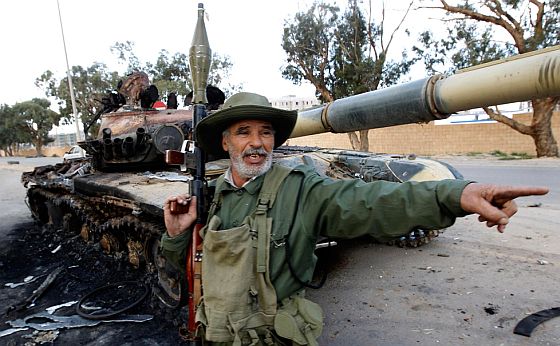The war in Libya did not begin on March 19.
That should not be forgotten because after 112 cruise missiles slammed into Libya’s air defense sites that day and the phrase “shock and awe” started getting tossed around once again, the implication for many observers was that Western intervention in Libya marked the beginning of another American-made war in the Arab world. It didn’t.
If I am asked, do you support the war? Or, do you support the intervention? Or, are you an interventionist? My response is: none of the above. They are all misleading questions.
By the week beginning March 13, the collapse of the Libyan revolution and the beginning of a major and very bloody assault on Benghazi were imminent. For anyone to believe in the likelihood of a massacre leading to thousands of deaths, did not depend on the political impact of dubiously sourced newspaper reports or how effectively highly questionable intelligence could be presented. Nor did it depend on ascribing to Muammar Gaddafi the intent to invade other countries or supply terrorists with weapons of mass destruction. Indeed, pretty much the only way one could avoid coming to the conclusion that Benghazi and its population of close to a million was in a position of immense danger would have been by avoiding reading the news.
Towns and cities along the Libyan coast that only days before had been liberated by a rag-tag army of protesters-turned-freedom-fighters, were being reclaimed by Gaddafi’s forces one by one as the rebels were pushed back towards Benghazi. The uprising had not been fully crushed, but it was in the process of rapid collapse.
When the members of the UN Security Council discussed the issue last week, debate did not revolve around whether the situation was urgent but on whether any consensus could be reached on how the international community could effectively respond to this emergency and prevent an assault on Benghazi. Since by that point there seemed no plausible way to protect the city other than by military force, the core issue became whether there was any validity to the claim that the fate of Benghazi had become an international responsibility.
In the end, no member of the Security Council was willing to assume a position which would effectively had said: what happens inside Libya’s borders is not our concern. Those who doubted that their concerns could be met through some form of military action, abstained.
In the wider arena of political debate, opposition to intervention in Libya has come primarily from those who are ideologically opposed to military intervention. Implicitly, their argument runs from the general to the particular.
Military intervention is always entered into with unrealistic optimism, inevitably has unintended consequences and will necessarily do more harm than good. Intervention in Libya will simply reaffirm what has universally already been shown to be true.
What about Benghazi?
The less said the better. Who knows, perhaps their plucky fighters would have been able to keep Gaddafi’s forces at bay. Perhaps Egypt would eventually have intervened.
What about the repeated appeals from the rebels?
From who? Who are these people? Is Libya really part of the wider Arab uprising or is this just a civil war in which the losing side wants our help?
“[W]e know nothing about the opposition. It ain’t Egypt,” declares Michael Ratner. As a hard-headed attorney, he says the only circumstance in which intervention in Libya could be justified would be “in response to genocide.”
It’s questionable whether a massacre of any size would cross that legal threshold, so Ratner’s message to the people there essentially amounts to this: sorry guys, you’re on your own.
And what about the impact the crushing of the Libyan uprising might have on the wider Arab revolution?
This for me is one of the most important questions. It’s clear that in Tunisia, Egypt, Yemen, Bahrain and Libya, everyone is fighting their own fight. It is also clear that there is a sense of solidarity that spans the Arab uprising — that the examples of Tunisia and then Egypt demonstrated to the region as a whole that ordinary people rising up en masse can in just a few weeks topple ruthless dictatorial regimes.
If Gaddafi stays in power he will demonstrate that popular support, enthusiasm, the use of social media, desperation and even the willingness to take up arms, will not necessarily be enough to bring down a dictator who is ruthless enough to set no limit on how much violence he is willing to use to crush his opponents.
This is a message that will disempower everyone now on the streets across the region, protesting to win their political rights. At the same time it will encourage every threatened regime and the security apparatus upon which each depends, to maintain their faith that violence can continue to sustain the status quo.
How intervention in Libya will ultimately impact the Arab democratic revolution we don’t know, but Gaddafi’s position is more vulnerable than it was a week ago. Success for Libya’s revolutionaries is far from guaranteed but they now have what is perhaps the most they can or should hope to derive from outside support — a fighting chance.


